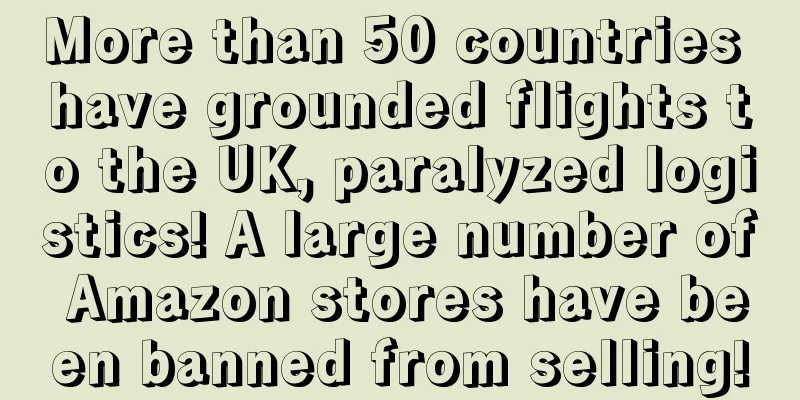|
Cross-border e-commerce sellers have recently been faced with a series of policy restrictions from various countries, including India's increase in import tariffs, restrictions on Chinese goods imported from many countries, suspension of international flights, and entry controls. 1. Policies of various countries on imported goods (involving Chinese goods): India: Raising import tariffs On February 1, India announced an increase in import tariffs on furniture, footwear, home appliances, mobile phone parts, toys and other products, and further revised relevant anti-dumping and related measures to restrict imports. The following is the tariff increase for each category: 1. Footwear: increased from 25% to 35%; 2. Toys: tariff increased from 20% to 60%; 3. Furniture such as chairs, lamps and mattresses: the tax rate will be increased from 20% to 25%; 4. The tariff on electrical appliances such as fans, food grinders/blenders, shavers, water heaters, ovens, toasters, coffee machines, heaters and irons, as well as fixed items such as filing cabinets and paper trays, will increase from 10% to 20%; 5. Commercial refrigerators: from 7.5% to 15%; 6. Refrigerator and air-conditioning compressors: from 10% to 12.5%; 7. Railway transportation of fans: from 7.5% to 10%; 8. The tariff on welding and plasma cutting machines will be increased from 7.5% to 10%; 9. The tariff on shelled walnuts will be increased from 30% to 100%. In addition, for electric vehicles, the tariff on imported fully built electric buses and electric trucks will be increased from 25% to 40%, the tariff on semi-finished products of buses, trucks and two-wheelers will be increased from 15% to 25%, the tariff on passenger cars and three-wheelers will be increased from 15% to 30%, and the tariff on imported kits of all electric vehicles (parts are imported into India for assembly) will be increased from 10% to 15%; Jordan: Suspend import of Chinese animal and plant products On February 2, Jordan announced that it would suspend the import of Chinese animal and plant products in order to prevent the spread of the new coronavirus in Jordan. The issuance of relevant import licenses has been suspended until further notice. The Ministry of Agriculture will review the decision in the "future period". Indonesia: Will not suspend imports of Chinese food On February 5, Indonesia scrapped its previous plan to stop food imports from China. Egypt: Bans onion imports from China Recently, the Egyptian Food Safety Authority announced a ban on the import of onions from China, and strengthened control over all food imported from Asian countries (regions), including strengthening cooperation with multiple agencies (mainly quarantine agencies) and strengthening inspections of all imported and exported goods. The head of the Egyptian Food Safety Authority emphasized that the Food Safety Authority will inspect more than 14 agricultural products, mainly potatoes, citrus fruits and peanuts. Recently, Russia's largest supermarket Magnit announced that it would suspend the import of vegetables and fruits from China. Vietnam: Notice on postponing customs clearance of goods Vietnam's Haiphong Port previously announced that containers imported from China need to undergo about 14 days of Wuhan novel pneumonia virus quarantine before they are allowed to be declared for import into Vietnam, and this 14-day quarantine period will not be included in the calculation of free time. Recently, the Vietnam Friendship Port also issued a reminder to suspend customs clearance of goods. On the evening of February 3, the Management Committee of the Dong Dang-Lang Son Port Economic Zone in Vietnam officially announced that the Vietnam Friendship Port will suspend customs clearance procedures for goods from February 4, 2020. Malaysia: There is no need to restrict imports of products from mainland China due to the epidemic On January 31, the Deputy Minister of the Ministry of International Trade and Industry (MITI) of Malaysia, Wang Jianmin, pointed out that although the new coronavirus is still spreading in mainland China, bilateral trade activities between the two countries continue, and there is no sign that the virus will invade Malaysia through commodities, so there is no need to restrict the import of products from mainland China. However, the Malaysian Customs Department still inspects meat and fruits and vegetables entering Malaysia as usual at various entry points in Malaysia. 2. Some countries and regions restrict the export of masks, protective clothing and other materials: India: Bans the export of any masks, protective clothing and other epidemic prevention supplies On January 31, the Directorate General of Foreign Trade of the Indian Ministry of Commerce and Industry issued a decree to ban the export of any epidemic prevention supplies such as masks and protective clothing. Nepal: Restrictions on exports of personal protective equipment such as masks On February 1, Nepal's Ministry of Health and Population issued an announcement, announcing that it would conduct an inspection of personal protective equipment such as masks and restrict their export if inventory could not be guaranteed. Iran announces suspension of export of medical masks On February 3, Safavi, director of the Medical Equipment and Supplies Department of the Iranian Food and Drug Organization, announced that after coordination with the customs, the export of medical masks without the authorization of the Ministry of Health would be suspended. After the outbreak of the new coronavirus, the demand for medical masks in the world market has increased sharply. In order to meet Iran's domestic demand, the export of any medical equipment must be approved by the Ministry of Health to prevent a shortage of medical masks in Iran. Thailand: Masks and other items are listed as controlled items In view of the recent tight supply and rising prices of masks and hand sanitizers on the market, the Thai government has decided to include the relevant items in the list of controlled goods. The Thai government's gazette website published an announcement on February 4, officially listing masks, polypropylene fibers used to produce masks, and hand sanitizers containing alcohol as controlled items, with a control period of one year. According to regulations, for controlled commodities, the Thai Ministry of Commerce can require manufacturers, distributors, importers and exporters to publicly disclose clear production quantities, import and export quantities, purchase prices, sales prices and retail prices, etc., and can assign merchants to allocate products to areas in short supply across the country, while limiting price increases to prevent unscrupulous merchants from driving up prices. South Korea: Restrictions on export of masks and disinfectants On February 5, the South Korean government announced that simplified customs clearance would no longer be applied when more than 1,000 masks or disinfectants are shipped out of the country. If there is suspected hoarding, the police will be called immediately. III. Summary of suspension information of inbound and outbound flights in various countries: 1. United Airlines: From February 6 to March 28, all China-US routes will be suspended except for one daily San Francisco-Hong Kong flight. Some China-US routes will continue to operate before February 6 (not included). 2. Air Canada: Air Canada, which has 33 flights to China every week, has canceled all direct flights to Beijing and Shanghai from January 30 to February 29. 3. American Airlines: Announced at 10:30AM CST on January 31 that all mainland China routes will be suspended from now until March 28. 4. Delta Air Lines: will suspend all mainland China routes from February 6 to April 30. 5. British Airways: British Airways announced on January 28 that it will suspend all flight services to and from mainland China, and the resumption date will be notified separately. 6. Air France: Air France will suspend flights from January 31 to February 9. 7. Lufthansa Group: Lufthansa, Swiss and Austrian Airlines: Flight cancellations to mainland China destinations (Beijing, Shanghai) are extended to February 29. Flight cancellations to mainland China (Nanjing, Shenyang, Qingdao) are extended to March 28. Flights to and from Hong Kong are not affected. 8. KLM Royal Dutch Airlines: Suspend all flights until February 9. 9. Finnair: Suspend all flights to mainland China from February 6 to 29. Cancel flights to Beijing Daxing and Guangzhou from February 5 to March 29, and cancel flights to Nanjing from February 8 to March 29. No bookings for Chinese routes will be accepted from January 31 to February 9. 10. Air Mauritius: Suspend all flights to Shanghai from January 31. 11. Scandinavian Airlines: From January 31, flights between Beijing and Shanghai and Europe will be suspended. The above routes will be suspended until February 9. 12. Azerbaijan Airlines: Cancel all flights to and from Beijing starting from February. 13. Air Astana: Cancel all flights between Kazakhstan and China. 14. Ural Airlines: Cancel all flights to and from China. 15. Iberia Airlines of Spain: From January 31, 2020, flights to Shanghai will be suspended until the end of February. 16. El Al: Temporarily suspend direct flights between Tel Aviv, Israel and Beijing, China from February 1 to March 25, 2020. 17. Turkish Airlines: Suspend flights to and from Shanghai, Guangzhou, Beijing and Xi'an until February 9. 18. Virgin Atlantic: Suspend flights between Shanghai and London. 19. Russia announced the suspension of flights between China and Russia, but retained Russian Airlines' Moscow-Beijing, Shanghai, Guangzhou, and Hong Kong routes. These flights will be uniformly adjusted to Sheremetyevo International Airport Terminal F from 17:00 on January 31. China Southern Airlines flight CZ655/6 will also be adjusted to Terminal F. Flights operated by Chinese airlines are currently continuing to operate. 20. Italy announced the suspension of all flights to and from mainland China. Direct flights between China and Italy operated by Chinese airlines and Italian charter company Neos will be affected. 21. Polish Airlines: Suspend operations on China routes (Beijing Daxing, Beijing Capital) until February 9. 22. Air Macau: Cancel 100 flights to mainland China only until February 1st. 23. Korean Air: From February 2 to 22, Incheon = Huangshan, Zhangjiajie, Changsha, Kunming, Qingdao KE845/6, Beijing KE859/60, Busan = Nanjing, Beijing will be temporarily suspended. Busan = Qingdao, Shanghai Pudong will be reduced from 7 flights per week to flights on Mondays, Wednesdays, Fridays and Sundays, and Jeju = Beijing will be reduced from 7 flights per week to flights on Tuesdays, Thursdays and Saturdays. From February 11 to 22, Incheon = Shenyang will be temporarily suspended. Wuhan route will be suspended until March 27. Other flights/routes are not affected for the time being. 24. Air India: Flights between India and Shanghai, China will be suspended from January 31 to February 14. 25. Indigo: It will suspend flights from Bangalore to Hong Kong from February 1 to February 20, and flights from Delhi to Chengdu from February 1 to February 20. 26. Lion Air: Lion Air will stop flying to China from February 1. Air Seoul, a low-cost airline under Asiana Airlines, will cancel all flights to China. 27. Jetstar Airways: Starting from this Friday (January 31), it will suspend flights to and from the Chinese cities of Hefei, Guiyang and Xuzhou. 28. Scoot: On January 29, it announced that all flights to and from Singapore and Wuhan will continue to be suspended until the end of March. 29. Myanmar National Airlines, Air KBZ, Myanmar Airways International: Suspended flights to China from February 1. 30. Cathay Pacific: Cathay Pacific has suspended all flights between Wuhan and Hong Kong. From January 30 to the end of March, it will reduce flights to and from the mainland by 50%, and has issued cabin service adjustment reminders for all flights to and from the mainland, suspending the supply of personal items such as towels and blankets. 31. Jeju Air: Cancel flights from Busan to Zhangjiajie on January 29 and January 30. 32. China Eastern Airlines: Cancel flights from Rome to Shanghai between January 31 and April 29. Cancel flights from Singapore to China (Shanghai/Changchun/Hangzhou/Quanzhou/Changsha/Yantai/Kunming) between February 2 (inclusive) and March 28 (inclusive), 2020. 33. Air China: Suspend the operation of Italian routes from January 31 to April 29, 2020, including flights on the Beijing-Rome, Beijing-Milan, Shanghai Pudong-Milan, and Hangzhou-Rome routes. Suspend the operation of Mongolian routes from February 1 to March 2, 2020, including flights on the Beijing-Ulaanbaatar and Hohhot-Ulaanbaatar routes. The daily CA969/970 flights from Beijing to Singapore will be retained, and other flights on the Beijing-Singapore route and the Chengdu-Singapore route will be canceled from February 2 to February 29, 2020. Cancel the flights on the Beijing-Ho Chi Minh, Beijing-Hanoi, Hangzhou-Nha Trang, Chongqing-Nha Trang routes from February 2 to March 28, 2020, and the Ho Chi Minh-Beijing flight on March 29. Cancel the Chengdu-Sydney flight from February 3 to March 28, 2020, and the Beijing-Sydney and Beijing-Melbourne flights from February 5 to February 29. 34. China Southern Airlines: From February 6 to February 29, flights from Beijing to Istanbul will be cancelled. From February 11 to March 28, flights from Beijing to Istanbul will be kept on week 2357 and week 146 will be cancelled; flights from Guangzhou to Istanbul will be kept on week 146 and week 2357 will be cancelled. Australia routes will be reduced as follows: From February 11 to March 28, only one daily flight CZ325/6 from Guangzhou to Sydney and one daily flight CZ321/344 from Guangzhou to Melbourne will be kept. North American routes will be reduced as follows: From February 11 to March 28, flights from Guangzhou to Los Angeles will be cancelled on week 246 and week 1357 will be kept; flights from Guangzhou to Vancouver will be cancelled on week 4 and week 1367 will be kept; flights from Guangzhou to Vancouver will be cancelled on week 477/8 and week 1367 will be kept; flights from Guangzhou to New York will be cancelled on week 1357 and week 246 will be kept. 35. Sichuan Airlines: Cancel some international flights from February 9 to March 2. 36. China Airlines: Cancel flights from Shanghai on February 8 and 9 and flights from Hong Kong to Kaohsiung on January 31. 37. Vietnam Airlines: Cancel flights from Beijing to Hanoi from February 8 to March 31, 2020. Flight numbers are VN513/VN512, and the operating hours are every Wednesday and Saturday. 38. Singapore Airlines: Cancel some flights between Singapore and the mainland from February 2020. 39. Etihad Airways: Will temporarily cancel the fifth freedom flight segment between Beijing and Nagoya. Flights to Shanghai and Chengdu will be cancelled from February 5 to February 10. 40. VietJet Air: All mainland China routes will be suspended from February 1 until further notice. 41. Qatar Airways: Starting from February 3, all direct commercial flights between Doha and six cities in mainland China (Beijing, Chengdu, Chongqing, Guangzhou, Hangzhou and Shanghai) will be suspended. 42. Emirates Airlines: All flights to and from Beijing will be cancelled from February 5. Please arrive at the EK counter at the airport for a medical check-up at least 8 hours in advance. 43. Japan Airlines: From February 17 to March 28, 2020, some flights will be suspended and flights on some routes will be reduced. Beijing route: JL020, JL025, JL869, JL860 will be suspended Shanghai route: JL873, JL872, JL877, JL874, JL879, JL876, JL883, JL884, JL897, JL898 will be suspended Guangzhou-Dalian route: JL087, JL088, JL827, JL828 will be reduced to four flights per week. 44. Air Tanzania: Postponed the first flight to China. 45. EgyptAir: Suspended all flights between China and Egypt. 46. Kenya Airways: Suspend flights to mainland China (Guangzhou) from now on. 47. Royal Air Maroc: From January 31 to February 29, it will suspend flights to mainland China (Beijing). The route was opened on January 16. 48. Rwanda Air: Suspends mainland China routes (Guangzhou) until further notice and will reassess the situation at the end of February. 49. Air New Zealand: From February 18 to March 31, the only mainland China route, New Zealand-Shanghai Pudong, will be reduced from one flight per day to four flights per week. 50. Jetstar Pacific: Suspend operations on China routes (Guangzhou and Hong Kong) from February 6. Entry regulations by country 51. South Korea: All Chinese passengers (except those from Hong Kong and Macao) transiting in South Korea must hold a South Korean visa. Without a South Korean visa, check-in procedures cannot be processed at the departure station and the above regulations will be implemented immediately. IV. Recent entry control measures of relevant countries compiled by the National Immigration Administration. (As of 20:00 on February 7)
(Source: Cross-border Knowledge)
|










